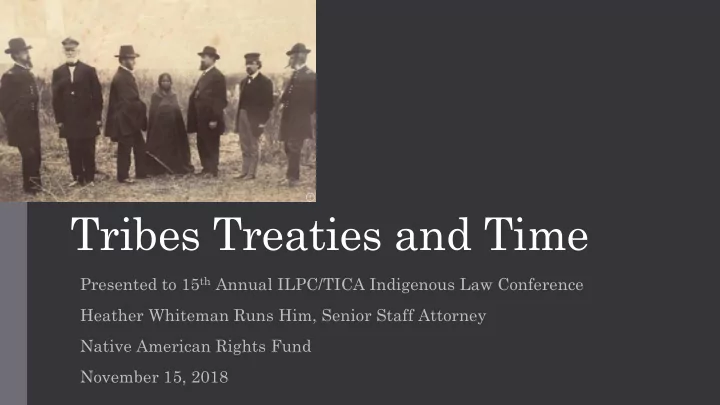

Tribes Treaties and Time Presented to 15 th Annual ILPC/TICA Indigenous Law Conference Heather Whiteman Runs Him, Senior Staff Attorney Native American Rights Fund November 15, 2018
Herrera’s case Clayvin Herrera, a Crow tribal citizen, and several companions, also Crow tribal citizens, are prosecuted by State of Wyoming for taking 4 bull elk out of season without a state license. All but Clayvin accept plea bargains for reduced sentences and fines.
Legal backdrop • Treaties of 1851, 1868 between United States and Crow Tribe • Ward v. Race Horse (1896) • Crow Tribe v. Repsis (10 th Cir. 1995) • Minnesota v. Mille Lacs Band (1999)
To hunt on the unoccupied lands
“Each major hunt started with the purification of a sweat bath and a prayer. In every case, the offering of a smoke and a prayer was always present. . . . We are given animals for a purpose, and through our knowledge of animals and Nature, we come closer to the Maker of All Things Above.” –Thomas Yellowtail
“We want to kill our own game and be glad…” –Bears Tooth, 1867 [T]he Treaty of 1868 not only did not forbid the Indians from hunting off the reserve but went so far as to guarantee them that right, and it will be seen that they have just cause of serious complaints. Of these facts, the Indians are not ignorant and it presents the Government in the light of not only acting unjustly but unlawfully as well. Our Government is certainly too great, too powerful, and too just to merit such a verdict. If we would civilize the Indians, let us by all means be fair and just to him, and ourselves observe the law we would enforce upon him. Letter from Agent Keller to Comm’r Price (Sept. 3, 1881)
[T]here is nothing on their reservation to subsist them[.] . . . By the terms of the 4 th article of the treaty of 1868, the Crows have the right to hunt upon the unoccupied lands of the United States, so long as game may be found thereon, and the land where the buffalo roam at large can hardly be called occupied, so that I really think that my Indians have the right to go outside their own country after buffalo, although I have been careful not to tell them so, but always the contrary. Letter from Agent Armstrong to Gen. Hatch (July 17, 1882)
What happened in the 150 years since the Treaty? • Numerous tribal members continue to hunt, some are caught and prosecuted or issued civil citations. • Crow Tribe replenishes elk herd in the twentieth century. • Bad Horse case • Ten Bear case • Crow Tribal members do not adopt agrarian lifestyle wholesale, and continue to hunt.
Allotment policy impact on landbase
The Importance of Subsistence Practices to the Modern Crow • Reservation economic data, especially unemployment statistics, underscore the importance of wild game as a food source. • Public health studies show that ancestral diets are key to reducing obesity, diabetes, and heart disease rates, among others. • Traditional hunting practices support a healthy lifestyle and cultural continuity. • Elk continue to hold significance and are necessary to Crow material culture and spirituality.
Why must off-reservation hunting continue? Why should Wyoming be forced to recognize this right? • Wyoming’s attempts to force elk away from Crow Reservation lands • Protecting the ability of the elk to maintain their natural migration route • Elk populations remain high, and treaty hunts would help manage the population and protect habitat. • Arguments set forth by State of Wyoming in the Herrera case fall flat. • Crow Tribe’s continued compliance with the terms of the 1868 Treaty of Fort Laramie – peace with the United States, continued existence of game, and lands at issue remain unoccupied.
Treaties and the Future • Ideas of “irreconcilability” and “impracticality” and “settled expectations” are one-sided and often based on racist and colonial ideals. • Building an approach to history seeking an honest and balanced perspective. • Continued need of tribal nations for U.S. compliance with the terms of these agreements. • Ongoing values associated with the terms of the treaties.
Recommend
More recommend